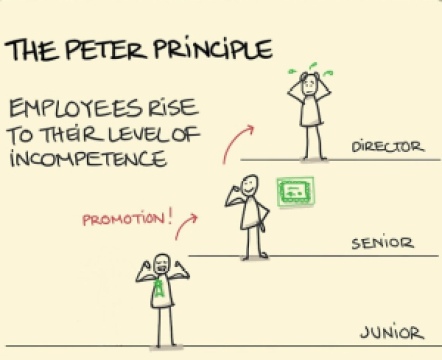Do you wonder why things are not looking good at work? Why does your hard work not pay off proportionally? Why is it that Tom, Dick & Harry got promoted while you are stuck here (reading this post)? Maybe it’s your first time experiencing this disappointment? Or may be you have had this frustration before? When things don’t seem good constantly, there may a reason underlying it.
In 1969, a psychologist named Dr. Laurence Peter came up with a principle – The Peter Principle that explains how an organisational hierarchy functions. It drills down the cause of why things really go wrong at workplace. While It may seem quite old, I found his wisdom relevant, even today. In fact, they even teach this in several management curriculum.
Why are some employees so Incompetent?
Do you ever wonder why you are surrounded by incompetent morons? (well, you may have at least one around?). Think about it this way – The skills required to get a job often have nothing to do with the job itself. This, is relevant in every job and every industry.
Consider Presidency for example, the skills required to run and win a political campaign are quite different from what it takes to do the actual job. Trump lives this example. Similarly, there is nothing about being a great surgeon that prepares a doctor to run a hospital. So by this means, a lot of people who shine bright in interviews might lack the skills to perform their job. No wonder, why you are stuck with them! 😕
And why are they getting promoted?
Speaking about promotions, there is a simple theory to this much coveted phenomenon. Everyone in an organization keeps on getting promoted until they reach their level of incompetence. At that point they stop being promoted. So given enough time and enough promotion levels, every position in a firm will be occupied by someone who can’t do the job.”

How do we let this happen?
The truth is, employees in a hierarchy do not really object to incompetence. They merely gossip about it. Question is, how can an employee move up the ladder when blocked by someone who has reached his level of incompetence? The answer – he can’t. Neither by his efforts nor by the help of a patron. This is because demotion is a rare phenomenon. The only way to rise up the ladder is to move into a promotion channel that is not blocked. In reality, this is often visible when people change departments or leave companies.
What happens when you are super competent?
If you are a supremely competent employee surrounded by idiots, you probably should be worried about your fate. 🙄 In most hierarchies, super-competence is more objectionable than incompetence. Ordinary incompetence, as seen, is no cause for dismissal: it is simply a bar to promotion. Super-competence often leads to dismissal, because it disrupts the hierarchy, and thereby violates the first commandment of hierarchical life: the hierarchy must be preserved.
Then, how do we get the work done?
If everyone eventually gets promoted to reach his or her level of incompetency, do you not wonder who really is turning the wheels at work? 😳 Well, we rarely find such a system where every employee has reached his level of incompetence. Work is accomplished by those, who have not yet reached their level of incompetence. In most instances, something is being done to delay their progress, so the hierarchy can still exist.
What does this mean for you?
Now you know why things don’t go well at work. You may be the one causing it 😉 OR perhaps you are just a victim of Peter principle. Question is, can you change your situation? Maybe. this is easier said than done.
Most organizations, these days, employ techniques to avoid the pit falls of Peter Principle. They attempt to flatten their organisational hierarchy. Be it by being agile or be it by sharing 360 degree feedback or be it any other mechanism. The truth is, while this might work for some, in most cases it just brings a false sense of accomplishment. (we aren’t all competent to steer this change)
So, going by the record, the Peter principle is here to stay, We can’t really get completely rid of it. Perhaps, it just helps to know that it exists and that’s why things go wrong at work!
© Copyright 2020. Megha Gupta. All rights reserved.
